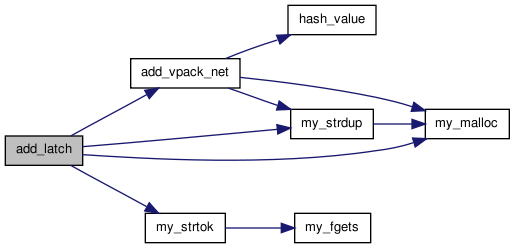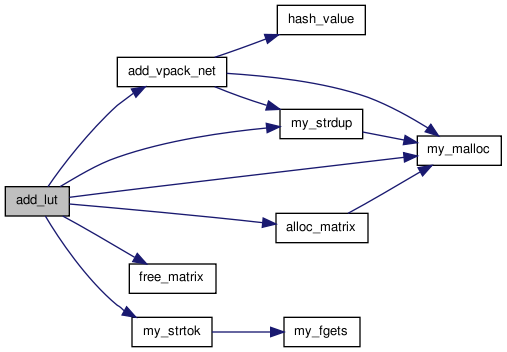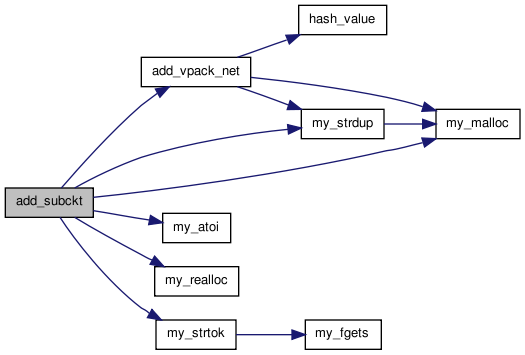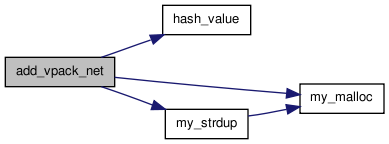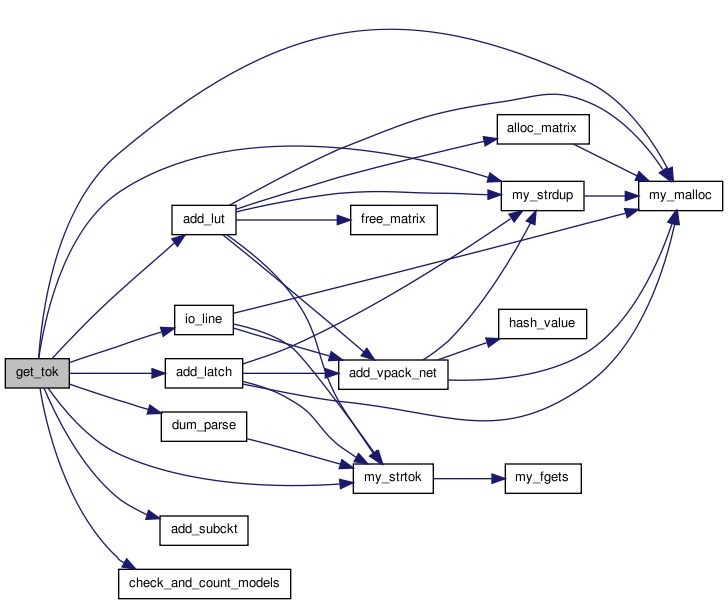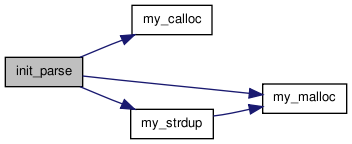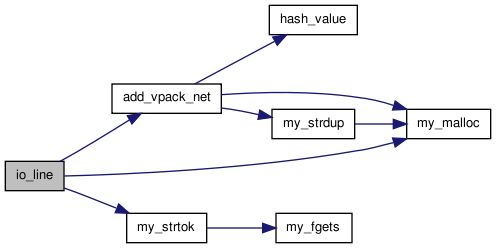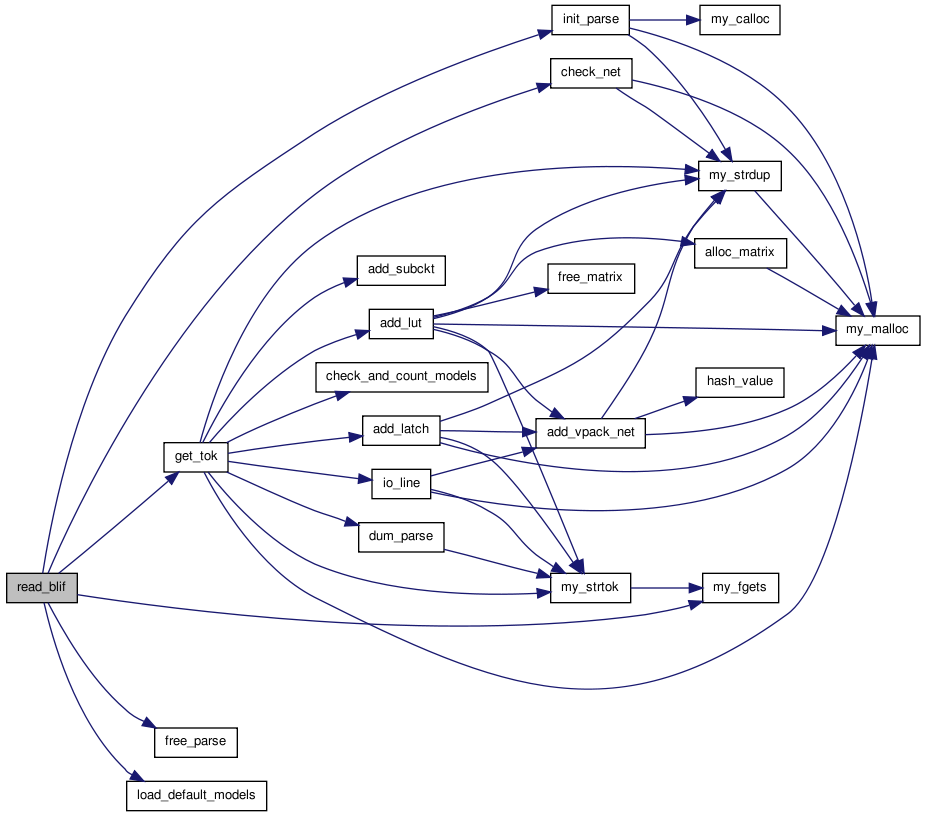#include <string.h>#include <stdio.h>#include <assert.h>#include "util.h"#include "vpr_types.h"#include "globals.h"#include "read_blif.h"#include "arch_types.h" Include dependency graph for read_blif.c:
Include dependency graph for read_blif.c:Go to the source code of this file.
Defines | |
| #define | HASHSIZE 4093 |
| #define | MAX_ATOM_PARSE 200000000 |
| #define | TOKENS " \t\n" |
Functions | |
| static int | add_vpack_net (char *ptr, int type, int bnum, int bport, int bpin, boolean is_global, int doall) |
| static void | get_tok (char *buffer, int pass, int doall, boolean *done, boolean *add_truth_table, INP t_model *inpad_model, INP t_model *outpad_model, INP t_model *logic_model, INP t_model *latch_model, INP t_model *user_models) |
| static void | init_parse (int doall) |
| static void | check_net (boolean sweep_hanging_nets_and_inputs) |
| static void | free_parse (void) |
| static void | io_line (int in_or_out, int doall, t_model *io_model) |
| static void | add_lut (int doall, t_model *logic_model) |
| static void | add_latch (int doall, INP t_model *latch_model) |
| static void | add_subckt (int doall, INP t_model *user_models) |
| static void | dum_parse (char *buf) |
| static int | hash_value (char *name) |
| static void | check_and_count_models (int doall, const char *model_name, t_model *user_models) |
| static void | load_default_models (INP t_model *library_models, OUTP t_model **inpad_model, OUTP t_model **outpad_model, OUTP t_model **logic_model, OUTP t_model **latch_model) |
| void | read_blif (char *blif_file, boolean sweep_hanging_nets_and_inputs, t_model *user_models, t_model *library_models) |
| static void | add_subckt (int doall, t_model *user_models) |
| void | echo_input (char *blif_file, char *echo_file, t_model *library_models) |
Variables | |
| static int * | num_driver |
| static int * | temp_num_pins |
| static int * | logical_block_input_count |
| static int * | logical_block_output_count |
| static int | num_blif_models |
| static int | ilines |
| static int | olines |
| static int | model_lines |
| static int | endlines |
| static struct hash_logical_nets ** | hash |
| static char * | model |
| static FILE * | blif |
Detailed Description
This source file will read in a FLAT blif netlist consisting of .inputs, .outputs, .names and .latch commands. It currently does not handle hierarchical blif files. Hierarchical blif files can be flattened via the read_blif and write_blif commands of sis. LUT circuits should only have .names commands; there should be no gates. This parser performs limited error checking concerning the consistency of the netlist it obtains. .inputs and .outputs statements must be given; this parser does not infer primary inputs and outputs from non-driven and fanout free nodes. This parser can be extended to do this if necessary, or the sis read_blif and write_blif commands can be used to put a netlist into the standard format. V. Betz, August 25, 1994. Added more error checking, March 30, 1995, V. Betz
Definition in file read_blif.c.
Define Documentation
| #define HASHSIZE 4093 |
Definition at line 13 of file read_blif.c.
| #define MAX_ATOM_PARSE 200000000 |
Definition at line 15 of file read_blif.c.
| #define TOKENS " \t\n" |
Function Documentation
| static void add_latch | ( | int | doall, |
| INP t_model * | latch_model | ||
| ) | [static] |
Adds the flipflop (.latch) currently being parsed to the logical_block array. Adds its pins to the nets data structure by calling add_vpack_net. If doall is zero this is a counting pass; if it is 1 this is the final (loading) pass. Blif format for a latch is: .latch <input> <output> <type (latch on)> <control (clock)> <init_val> The latch pins are in .nets 0 to 2 in the order: Q D CLOCK.
Definition at line 472 of file read_blif.c.
{
char *ptr, buf[BUFSIZE], saved_names[6][BUFSIZE];
int i;
num_logical_blocks++;
/* Count # parameters, making sure we don't go over 6 (avoids memory corr.) */
/* Note that we can't rely on the tokens being around unless we copy them. */
for(i = 0; i < 6; i++)
{
ptr = my_strtok(NULL, TOKENS, blif, buf);
if(ptr == NULL)
break;
strcpy(saved_names[i], ptr);
}
if(i != 5)
{
fprintf(stderr, "Error: .latch does not have 5 parameters.\n" "check the netlist, line %d.\n", linenum);
exit(1);
}
if(!doall)
{ /* If only a counting pass ... */
add_vpack_net(saved_names[0], RECEIVER, num_logical_blocks - 1, 0, 0, FALSE, doall); /* D */
add_vpack_net(saved_names[1], DRIVER, num_logical_blocks - 1, 0, 0, FALSE, doall); /* Q */
add_vpack_net(saved_names[3], RECEIVER, num_logical_blocks - 1, 0, 0, TRUE, doall); /* Clock */
return;
}
logical_block[num_logical_blocks - 1].model = latch_model;
logical_block[num_logical_blocks - 1].type = VPACK_LATCH;
logical_block[num_logical_blocks - 1].input_nets =
(int **) my_malloc(sizeof(int*));
logical_block[num_logical_blocks - 1].output_nets =
(int **) my_malloc(sizeof(int*));
logical_block[num_logical_blocks - 1].input_nets[0] =
(int *) my_malloc(sizeof(int));
logical_block[num_logical_blocks - 1].output_nets[0] =
(int *) my_malloc(sizeof(int));
logical_block[num_logical_blocks - 1].output_nets[0][0] = add_vpack_net(saved_names[1], DRIVER, num_logical_blocks - 1, 0, 0, FALSE, doall); /* Q */
logical_block[num_logical_blocks - 1].input_nets[0][0] = add_vpack_net(saved_names[0], RECEIVER, num_logical_blocks - 1, 0, 0, FALSE, doall); /* D */
logical_block[num_logical_blocks - 1].clock_net = add_vpack_net(saved_names[3], RECEIVER, num_logical_blocks - 1, 0, 0, TRUE, doall); /* Clock */
logical_block[num_logical_blocks - 1].name = my_strdup(saved_names[1]);
logical_block[num_logical_blocks - 1].truth_table = NULL;
num_latches++;
}
 Here is the call graph for this function:
Here is the call graph for this function: Here is the caller graph for this function:
Here is the caller graph for this function:| static void add_lut | ( | int | doall, |
| t_model * | logic_model | ||
| ) | [static] |
Adds a LUT as VPACK_COMB from (.names) currently being parsed to the logical_block array. Adds its pins to the nets data structure by calling add_vpack_net. If doall is zero this is a counting pass; if it is 1 this is the final (loading) pass.
Definition at line 393 of file read_blif.c.
{
char *ptr, **saved_names, buf[BUFSIZE];
int i, j, output_net_index;
saved_names = (char**) alloc_matrix(0, logic_model->inputs->size, 0, BUFSIZE - 1, sizeof(char));
num_logical_blocks++;
/* Count # nets connecting */
i = 0;
while((ptr = my_strtok(NULL, TOKENS, blif, buf)) != NULL)
{
strcpy(saved_names[i], ptr);
i++;
}
output_net_index = i - 1;
if(strcmp(saved_names[output_net_index],"unconn") == 0) {
/* unconn is a keyword to pad unused pins, ignore this block */
free_matrix(saved_names, 0, logic_model->inputs->size, 0, sizeof(char));
num_logical_blocks--;
return;
}
if(!doall)
{ /* Counting pass only ... */
for(j = 0; j <= output_net_index; j++)
/* On this pass it doesn't matter if RECEIVER or DRIVER. Just checking if in hash. [0] should be DRIVER */
add_vpack_net(saved_names[j], RECEIVER, num_logical_blocks - 1, 0, j, FALSE, doall);
free_matrix(saved_names, 0, logic_model->inputs->size, 0, sizeof(char));
return;
}
logical_block[num_logical_blocks - 1].model = logic_model;
if(output_net_index > logic_model->inputs->size) {
printf(ERRTAG "LUT size of %d in .blif file is too big for FPGA which has a maximum LUT size of %d\n",
output_net_index, logic_model->inputs->size);
exit(1);
}
assert(logic_model->inputs->next == NULL);
assert(logic_model->outputs->next == NULL);
assert(logic_model->outputs->size == 1);
logical_block[num_logical_blocks - 1].input_nets =
(int **) my_malloc(sizeof(int*));
logical_block[num_logical_blocks - 1].output_nets =
(int **) my_malloc(sizeof(int*));
logical_block[num_logical_blocks - 1].clock_net = OPEN;
logical_block[num_logical_blocks - 1].input_nets[0] =
(int *) my_malloc(logic_model->inputs->size * sizeof(int));
logical_block[num_logical_blocks - 1].output_nets[0] =
(int *) my_malloc(sizeof(int));
logical_block[num_logical_blocks - 1].type = VPACK_COMB;
for(i = 0; i < output_net_index; i++) /* Do inputs */
logical_block[num_logical_blocks - 1].input_nets[0][i] = add_vpack_net(saved_names[i], RECEIVER, num_logical_blocks - 1, 0, i, FALSE, doall);
logical_block[num_logical_blocks - 1].output_nets[0][0] = add_vpack_net(saved_names[output_net_index], DRIVER, num_logical_blocks - 1, 0, 0, FALSE, doall);
for(i = output_net_index; i < logic_model->inputs->size; i++)
logical_block[num_logical_blocks - 1].input_nets[0][i] = OPEN;
logical_block[num_logical_blocks - 1].name = my_strdup(saved_names[output_net_index]);
logical_block[num_logical_blocks - 1].truth_table = NULL;
num_luts++;
free_matrix(saved_names, 0, logic_model->inputs->size, 0, sizeof(char));
}
 Here is the call graph for this function:
Here is the call graph for this function: Here is the caller graph for this function:
Here is the caller graph for this function:| static void add_subckt | ( | int | doall, |
| INP t_model * | user_models | ||
| ) | [static] |
 Here is the caller graph for this function:
Here is the caller graph for this function:| static void add_subckt | ( | int | doall, |
| t_model * | user_models | ||
| ) | [static] |
Definition at line 528 of file read_blif.c.
{
char *ptr;
char *close_bracket;
char subckt_name[BUFSIZE];
char buf[BUFSIZE];
fpos_t current_subckt_pos;
int i, j, iparse;
int subckt_index_signals = 0;
char **subckt_signal_name = NULL;
char *port_name, *pin_number;
char **circuit_signal_name = NULL;
char *subckt_logical_block_name = NULL;
short toggle = 0;
int input_net_count, output_net_count, input_port_count, output_port_count;
t_model *cur_model;
t_model_ports *port;
boolean found_subckt_signal;
num_logical_blocks++;
num_subckts++;
/* now we have to find the matching subckt */
/* find the name we are looking for */
strcpy(subckt_name, my_strtok(NULL, TOKENS, blif, buf));
/* get all the signals in the form z=r */
iparse = 0;
while(iparse < MAX_ATOM_PARSE)
{
iparse++;
/* Assumpiton is that it will be "signal1, =, signal1b, spacing, and repeat" */
ptr = my_strtok(NULL, " \t\n=", blif, buf);
if(ptr == NULL && toggle == 0)
break;
else if (ptr == NULL && toggle == 1)
{
printf("subckt %s formed incorrectly with signal=signal at\n", subckt_name, buf);
exit(-1);
}
else if (toggle == 0)
{
/* ELSE - parse in one or the other */
/* allocate a new spot for both the circuit_signal name and the subckt_signal name */
subckt_signal_name = (char**)my_realloc(subckt_signal_name, (subckt_index_signals+1)*sizeof(char**));
circuit_signal_name = (char**)my_realloc(circuit_signal_name, (subckt_index_signals+1)*sizeof(char**));
/* copy in the subckt_signal name */
subckt_signal_name[subckt_index_signals] = my_strdup(ptr);
toggle = 1;
}
else if (toggle == 1)
{
/* copy in the circuit_signal name */
circuit_signal_name[subckt_index_signals] = my_strdup(ptr);
if(!doall) {
/* Counting pass, does not matter if driver or receiver and pin number does not matter */
add_vpack_net(circuit_signal_name[subckt_index_signals], RECEIVER, num_logical_blocks - 1, 0, 0, FALSE, doall);
}
toggle = 0;
subckt_index_signals++;
}
}
assert(iparse < MAX_ATOM_PARSE);
/* record the position of the parse so far so when we resume we will move to the next item */
if (fgetpos(blif, ¤t_subckt_pos) != 0)
{
printf("Error in file pointer read - read_blif.c\n");
exit(-1);
}
input_net_count = 0;
output_net_count = 0;
if (doall)
{
/* get the matching model to this subckt */
cur_model = user_models;
while(cur_model != NULL) {
if(strcmp(cur_model->name, subckt_name) == 0) {
break;
}
cur_model = cur_model->next;
}
if (cur_model == NULL)
{
printf("Didn't find matching model to subckt %s - error\n", subckt_name);
exit(-1);
}
/* IF - do all then we need to allocate a string to hold all the subckt info */
/* initialize the logical_block structure */
/* record model info */
logical_block[num_logical_blocks-1].model = cur_model;
/* allocate space for inputs and initialize all input nets to OPEN */
input_port_count = 0;
port = cur_model->inputs;
while(port) {
if(!port->is_clock) {
input_port_count++;
}
port = port->next;
}
logical_block[num_logical_blocks-1].input_nets = my_malloc(input_port_count * sizeof(int *));
port = cur_model->inputs;
while(port) {
if(port->is_clock) {
/* Clock ports are different from regular input ports, skip */
port = port->next;
continue;
}
assert (port->size >= 0);
logical_block[num_logical_blocks-1].input_nets[port->index] = my_malloc(port->size * sizeof(int));
for(j = 0; j < port->size; j++) {
logical_block[num_logical_blocks-1].input_nets[port->index][j] = OPEN;
}
port = port->next;
}
assert(port == NULL || (port->is_clock && port->next == NULL));
/* allocate space for outputs and initialize all output nets to OPEN */
output_port_count = 0;
port = cur_model->outputs;
while(port){
port = port->next;
output_port_count++;
}
logical_block[num_logical_blocks-1].output_nets = my_malloc(output_port_count * sizeof(int *));
port = cur_model->outputs;
while(port) {
assert (port->size >= 0);
logical_block[num_logical_blocks-1].output_nets[port->index] = my_malloc(port->size * sizeof(int));
for(j = 0; j < port->size; j++) {
logical_block[num_logical_blocks-1].output_nets[port->index][j] = OPEN;
}
port = port->next;
}
assert(port == NULL);
/* initialize clock data */
logical_block[num_logical_blocks-1].clock_net = OPEN;
logical_block[num_logical_blocks-1].type = VPACK_COMB;
logical_block[num_logical_blocks - 1].truth_table = NULL;
/* setup the index signal if open or not */
for(i = 0; i < subckt_index_signals; i++) {
found_subckt_signal = FALSE;
/* determine the port name and the pin_number of the subckt */
port_name = my_strdup(subckt_signal_name[i]);
pin_number = strrchr(port_name, '[');
if(pin_number == NULL) {
pin_number = "0"; /* default to 0 */
} else {
/* The pin numbering is port_name[pin_number] so need to go one to the right of [ then NULL out ] */
*pin_number = '\0';
pin_number++;
close_bracket = pin_number;
while(*close_bracket != '\0' && *close_bracket != ']') {
close_bracket++;
}
*close_bracket = '\0';
}
port = cur_model->inputs;
while(port) {
if(strcmp(port_name, port->name) == 0) {
if(found_subckt_signal) {
printf(ERRTAG "Two instances of %s subckt signal found in subckt %s\n",
subckt_signal_name[i], subckt_name);
}
found_subckt_signal = TRUE;
if(port->is_clock) {
assert(logical_block[num_logical_blocks-1].clock_net == OPEN);
assert(my_atoi(pin_number) == 0);
logical_block[num_logical_blocks-1].clock_net =
add_vpack_net(circuit_signal_name[i], RECEIVER, num_logical_blocks - 1, port->index, my_atoi(pin_number), TRUE, doall);
} else {
logical_block[num_logical_blocks-1].input_nets[port->index][my_atoi(pin_number)] =
add_vpack_net(circuit_signal_name[i], RECEIVER, num_logical_blocks - 1, port->index, my_atoi(pin_number), FALSE, doall);
input_net_count++;
}
}
port = port->next;
}
port = cur_model->outputs;
while(port) {
if(strcmp(port_name, port->name) == 0) {
if(found_subckt_signal) {
printf(ERRTAG "Two instances of %s subckt signal found in subckt %s\n",
subckt_signal_name[i], subckt_name);
}
found_subckt_signal = TRUE;
logical_block[num_logical_blocks-1].output_nets[port->index][my_atoi(pin_number)] =
add_vpack_net(circuit_signal_name[i], DRIVER, num_logical_blocks - 1, port->index, my_atoi(pin_number), FALSE, doall);
if(subckt_logical_block_name == NULL && circuit_signal_name[i] != NULL) {
subckt_logical_block_name = circuit_signal_name[i];
}
output_net_count++;
}
port = port->next;
}
/* record the name to be first output net parsed */
logical_block[num_logical_blocks-1].name = my_strdup(subckt_logical_block_name);
if(!found_subckt_signal) {
printf("Unknown subckt port %s\n", subckt_signal_name[i]);
exit(1);
}
}
}
for(i = 0; i < subckt_index_signals; i++) {
free(subckt_signal_name[i]);
free(circuit_signal_name[i]);
}
free(subckt_signal_name);
free(circuit_signal_name);
/* now that you've done the analysis, move the file pointer back */
if (fsetpos(blif, ¤t_subckt_pos) != 0)
{
printf("Error in moving back file pointer - read_blif.c\n");
exit(-1);
}
}
 Here is the call graph for this function:
Here is the call graph for this function:| static int add_vpack_net | ( | char * | ptr, |
| int | type, | ||
| int | bnum, | ||
| int | bport, | ||
| int | bpin, | ||
| boolean | is_global, | ||
| int | doall | ||
| ) | [static] |
This routine is given a vpack_net name in *ptr, either DRIVER or RECEIVER specifying whether the logical_block number (bnum) and the output pin (bpin) is driving this vpack_net or in the fan-out and doall, which is 0 for the counting pass and 1 for the loading pass. It updates the vpack_net data structure and returns the vpack_net number so the calling routine can update the logical_block data structure.
Definition at line 875 of file read_blif.c.
{
struct hash_logical_nets *h_ptr, *prev_ptr;
int index, j, nindex;
if(strcmp(ptr, "open") == 0) {
printf(ERRTAG "net name \"open\" is a reserved keyword in VPR");
exit(1);
}
if(strcmp(ptr, "unconn") == 0) {
return OPEN;
}
index = hash_value(ptr);
if(doall) {
if(type == RECEIVER && !is_global) {
logical_block_input_count[bnum]++;
} else if (type == DRIVER) {
logical_block_output_count[bnum]++;
}
}
h_ptr = hash[index];
prev_ptr = h_ptr;
while(h_ptr != NULL)
{
if(strcmp(h_ptr->name, ptr) == 0)
{ /* Net already in hash table */
nindex = h_ptr->index;
if(!doall)
{ /* Counting pass only */
(h_ptr->count)++;
return (nindex);
}
if(type == DRIVER)
{
num_driver[nindex]++;
j = 0; /* Driver always in position 0 of pinlist */
}
else
{
vpack_net[nindex].num_sinks++;
if((num_driver[nindex] < 0) || (num_driver[nindex] > 1)) {
printf(ERRTAG "number of drivers for net #%d (%s) has %d drivers.\n",
nindex, ptr, num_driver[index]);
}
j = vpack_net[nindex].num_sinks;
/* num_driver is the number of signal drivers of this vpack_net. *
* should always be zero or 1 unless the netlist is bad. */
if((vpack_net[nindex].num_sinks - num_driver[nindex]) >= temp_num_pins[nindex])
{
printf ("Error: Net #%d (%s) has no driver and will cause\n", nindex, ptr);
printf("memory corruption.\n");
exit(1);
}
}
vpack_net[nindex].node_block[j] = bnum;
vpack_net[nindex].node_block_port[j] = bport;
vpack_net[nindex].node_block_pin[j] = bpin;
vpack_net[nindex].is_global = is_global;
return (nindex);
}
prev_ptr = h_ptr;
h_ptr = h_ptr->next;
}
/* Net was not in the hash table. */
if(doall == 1)
{
printf("Error in add_vpack_net: the second (load) pass could not\n");
printf("find vpack_net %s in the symbol table.\n", ptr);
exit(1);
}
/* Add the vpack_net (only counting pass will add nets to symbol table). */
num_logical_nets++;
h_ptr = (struct hash_logical_nets *)my_malloc(sizeof(struct hash_logical_nets));
if(prev_ptr == NULL)
{
hash[index] = h_ptr;
}
else
{
prev_ptr->next = h_ptr;
}
h_ptr->next = NULL;
h_ptr->index = num_logical_nets - 1;
h_ptr->count = 1;
h_ptr->name = my_strdup(ptr);
return (h_ptr->index);
}
 Here is the call graph for this function:
Here is the call graph for this function: Here is the caller graph for this function:
Here is the caller graph for this function:| static void check_and_count_models | ( | int | doall, |
| const char * | model_name, | ||
| t_model * | user_models | ||
| ) | [static] |
Definition at line 836 of file read_blif.c.
{
fpos_t start_pos;
t_model *user_model;
num_blif_models++;
if(doall) {
/* get start position to do two passes on model */
if (fgetpos(blif, &start_pos) != 0)
{
printf(ERRTAG "in file pointer read - read_blif.c\n");
exit(-1);
}
/* get corresponding architecture model */
user_model = user_models;
while(user_model) {
if(0 == strcmp(model_name, user_model->name)) {
break;
}
user_model = user_model->next;
}
if(user_model == NULL) {
printf(ERRTAG "No corresponding model %s in architecture description \n", model_name);
exit(1);
}
/* check ports */
}
}
 Here is the caller graph for this function:
Here is the caller graph for this function:| static void check_net | ( | boolean | sweep_hanging_nets_and_inputs | ) | [static] |
Checks the input netlist for obvious errors.
Definition at line 1167 of file read_blif.c.
{
int i, j, k, error, iblk, ipin, iport, inet, check_net;
boolean found;
int count_inputs, count_outputs;
int explicit_vpack_models;
t_model_ports *port;
struct s_linked_vptr *p_io_removed;
int removed_nets;
explicit_vpack_models = num_blif_models + 1;
error = 0;
removed_nets = 0;
if(ilines != explicit_vpack_models)
{
printf(ERRTAG "Found %d .inputs lines; expected %d.\n", ilines, explicit_vpack_models);
error++;
}
if(olines != explicit_vpack_models)
{
printf(ERRTAG "Found %d .outputs lines; expected %d.\n", olines,explicit_vpack_models);
error++;
}
if(model_lines != explicit_vpack_models)
{
printf(ERRTAG "Found %d .model lines; expected %d.\n", model_lines, num_blif_models + 1);
error++;
}
if(endlines != explicit_vpack_models)
{
printf(ERRTAG "Found %d .end lines; expected %d.\n", endlines, explicit_vpack_models);
error++;
}
for(i = 0; i < num_logical_nets; i++)
{
if(num_driver[i] != 1)
{
printf(ERRTAG "vpack_net %s has" " %d signals driving it.\n", vpack_net[i].name, num_driver[i]);
error++;
}
if(vpack_net[i].num_sinks == 0)
{
/* If this is an input pad, it is unused and I just remove it with *
* a warning message. Lots of the mcnc circuits have this problem.
Also, subckts from ODIN often have unused driven nets
*/
iblk = vpack_net[i].node_block[0];
iport = vpack_net[i].node_block_port[0];
ipin = vpack_net[i].node_block_pin[0];
assert((vpack_net[i].num_sinks - num_driver[i]) == -1);
/* All nets should connect to inputs of block except output pads */
if(logical_block[iblk].type != VPACK_OUTPAD) {
if(sweep_hanging_nets_and_inputs) {
removed_nets++;
vpack_net[i].node_block[0] = OPEN;
vpack_net[i].node_block_port[0] = OPEN;
vpack_net[i].node_block_pin[0] = OPEN;
logical_block[iblk].output_nets[iport][ipin] = OPEN;
logical_block_output_count[iblk]--;
} else {
printf(WARNTAG "vpack_net %s has no fanout.\n", vpack_net[i].name);
}
continue;
}
}
if(strcmp(vpack_net[i].name, "open") == 0 || strcmp(vpack_net[i].name, "unconn") == 0)
{
printf(ERRTAG "vpack_net #%d has the reserved name %s.\n", i, vpack_net[i].name);
error++;
}
for(j = 0; j <= vpack_net[i].num_sinks; j++) {
iblk = vpack_net[i].node_block[j];
iport = vpack_net[i].node_block_port[j];
ipin = vpack_net[i].node_block_pin[j];
if(ipin == OPEN) {
/* Clocks are not connected to regular pins on a block hence open */
check_net = logical_block[iblk].clock_net;
if(check_net != i) {
printf("Internal Error: clock net for block %s #%d is net %s #%d but connecting net is %s #%d\n",
logical_block[iblk].name, iblk,
vpack_net[check_net].name, check_net,
vpack_net[i].name, i);
error++;
}
} else {
if(j == 0) {
check_net = logical_block[iblk].output_nets[iport][ipin];
if(check_net != i) {
printf("Internal Error: output net for block %s #%d is net %s #%d but connecting net is %s #%d\n",
logical_block[iblk].name, iblk,
vpack_net[check_net].name, check_net,
vpack_net[i].name, i);
error++;
}
} else {
if(vpack_net[i].is_global) {
check_net = logical_block[iblk].clock_net;
} else {
check_net = logical_block[iblk].input_nets[iport][ipin];
}
if(check_net != i) {
printf("Internal Error: input net for block %s #%d is net %s #%d but connecting net is %s #%d\n",
logical_block[iblk].name, iblk,
vpack_net[check_net].name, check_net,
vpack_net[i].name, i);
error++;
}
}
}
}
}
printf("Swept away %d nets with no fanout\n", removed_nets);
for(i = 0; i < num_logical_blocks; i++)
{
/* This block has no output and is not an output pad so it has no use, hence we remove it */
if((logical_block_output_count[i] == 0) && (logical_block[i].type != VPACK_OUTPAD)) {
printf(WARNTAG "logical_block %s #%d has no fanout.\n", logical_block[i].name, i);
if(sweep_hanging_nets_and_inputs && (logical_block[i].type == VPACK_INPAD)) {
logical_block[i].type = VPACK_EMPTY;
printf(" Removing input\n");
p_io_removed = my_malloc(sizeof(struct s_linked_vptr));
p_io_removed->data_vptr = my_strdup(logical_block[i].name);
p_io_removed->next = circuit_p_io_removed;
circuit_p_io_removed = p_io_removed;
continue;
} else {
printf(" " ERRTAG " sweep hanging nodes in your logic synthesis tool because VPR can't do this yet\n");
error++;
}
}
count_inputs = 0;
count_outputs = 0;
port = logical_block[i].model->inputs;
while(port) {
if(port->is_clock)
{
port = port->next;
continue;
}
for(j = 0; j < port->size; j++)
{
if(logical_block[i].input_nets[port->index][j] == OPEN)
continue;
count_inputs++;
inet = logical_block[i].input_nets[port->index][j];
found = FALSE;
for(k = 1; k <= vpack_net[inet].num_sinks; k++)
{
if(vpack_net[inet].node_block[k] == i) {
if(vpack_net[inet].node_block_port[k] == port->index) {
if(vpack_net[inet].node_block_pin[k] == j) {
found = TRUE;
}
}
}
}
assert(found == TRUE);
}
port = port->next;
}
assert(count_inputs == logical_block_input_count[i]);
logical_block[i].used_input_pins = count_inputs;
port = logical_block[i].model->outputs;
while(port) {
for(j = 0; j < port->size; j++)
{
if(logical_block[i].output_nets[port->index][j] == OPEN)
continue;
count_outputs++;
inet = logical_block[i].output_nets[port->index][j];
vpack_net[inet].is_const_gen = FALSE;
if(count_inputs == 0 && logical_block[i].type != VPACK_INPAD && logical_block[i].type != VPACK_OUTPAD && logical_block[i].clock_net == OPEN) {
printf("Net is a constant generator: %s\n", vpack_net[inet].name);
vpack_net[inet].is_const_gen = TRUE;
}
found = FALSE;
if(vpack_net[inet].node_block[0] == i) {
if(vpack_net[inet].node_block_port[0] == port->index) {
if(vpack_net[inet].node_block_pin[0] == j) {
found = TRUE;
}
}
}
assert(found == TRUE);
}
port = port->next;
}
assert(count_outputs == logical_block_output_count[i]);
if(logical_block[i].type == VPACK_LATCH)
{
if(logical_block_input_count[i] != 1)
{
printf (ERRTAG "Latch #%d with output %s has %d input pin(s), expected one (D).\n", i, logical_block[i].name, logical_block_input_count[i]);
error++;
}
if(logical_block_output_count[i] != 1)
{
printf (ERRTAG "Latch #%d with output %s has %d output pin(s), expected one (Q).\n", i, logical_block[i].name, logical_block_output_count[i]);
error++;
}
if(logical_block[i].clock_net == OPEN)
{
printf (ERRTAG "Latch #%d with output %s has no clock.\n", i, logical_block[i].name);
error++;
}
}
else if(logical_block[i].type == VPACK_INPAD)
{
if(logical_block_input_count[i] != 0) {
printf (ERRTAG "io inpad logical_block #%d name %s of type %d" "has %d input pins.\n",
i, logical_block[i].name, logical_block[i].type, logical_block_input_count[i]);
error++;
}
if(logical_block_output_count[i] != 1) {
printf (ERRTAG "io inpad logical_block #%d name %s of type %d" "has %d output pins.\n",
i, logical_block[i].name, logical_block[i].type, logical_block_output_count[i]);
error++;
}
if(logical_block[i].clock_net != OPEN)
{
printf (ERRTAG "io inpad #%d with output %s has clock.\n", i, logical_block[i].name);
error++;
}
}
else if(logical_block[i].type == VPACK_OUTPAD)
{
if(logical_block_input_count[i] != 1) {
printf (ERRTAG "io outpad logical_block #%d name %s of type %d" "has %d input pins.\n",
i, logical_block[i].name, logical_block[i].type, logical_block_input_count[i]);
error++;
}
if(logical_block_output_count[i] != 0) {
printf (ERRTAG "io outpad logical_block #%d name %s of type %d" "has %d output pins.\n",
i, logical_block[i].name, logical_block[i].type, logical_block_output_count[i]);
error++;
}
if(logical_block[i].clock_net != OPEN)
{
printf (ERRTAG "io outpad #%d with name %s has clock.\n", i, logical_block[i].name);
error++;
}
}
else if(logical_block[i].type == VPACK_COMB)
{
if(logical_block_input_count[i] <= 0)
{
printf ("Warning: logical_block #%d with output %s has only %d pin.\n", i, logical_block[i].name, logical_block_input_count[i]);
if(logical_block_input_count[i] < 0)
{
error++;
}
else
{
if(logical_block_output_count[i] > 0) {
printf ("\tBlock contains output -- may be a constant generator.\n");
} else {
printf ("\t" ERRTAG "Block contains no output.\n");
error++;
}
}
}
if(strcmp(logical_block[i].model->name, MODEL_LOGIC) == 0) {
if(logical_block_output_count[i] != 1) {
printf (ERRTAG "logical_block #%d name %s of model %s \n has %d output pins instead of 1.\n",
i, logical_block[i].name, logical_block[i].model->name, logical_block_output_count[i]);
error++;
}
}
} else {
printf(ERRTAG "Unknown type for logical_block #%d %s\n", i, logical_block[i].name);
}
}
if(error != 0)
{
printf("Found %d fatal errors in the input netlist.\n", error);
exit(1);
}
}
 Here is the call graph for this function:
Here is the call graph for this function: Here is the caller graph for this function:
Here is the caller graph for this function:| static void dum_parse | ( | char * | buf | ) | [static] |
Continue parsing to the end of this (possibly continued) line.
Definition at line 380 of file read_blif.c.
 Here is the call graph for this function:
Here is the call graph for this function: Here is the caller graph for this function:
Here is the caller graph for this function:| void echo_input | ( | char * | blif_file, |
| char * | echo_file, | ||
| t_model * | library_models | ||
| ) |
Echo back the netlist data structures to file input.echo to allow the user to look at the internal state of the program and check the parsing.
Definition at line 1007 of file read_blif.c.
{
int i, j;
FILE *fp;
t_model_ports *port;
t_model *latch_model;
t_model *logic_model;
t_model *cur;
int *lut_distribution;
int num_absorbable_latch;
int inet;
cur = library_models;
logic_model = latch_model = NULL;
while(cur) {
if(strcmp(cur->name, MODEL_LOGIC) == 0) {
logic_model = cur;
assert(logic_model->inputs->next == NULL);
} else if(strcmp(cur->name, MODEL_LATCH) == 0) {
latch_model = cur;
assert(latch_model->inputs->size == 1);
}
cur = cur->next;
}
lut_distribution = my_calloc(logic_model->inputs[0].size + 1, sizeof(int));
num_absorbable_latch = 0;
for(i = 0; i < num_logical_blocks; i++) {
if(logical_block[i].model == logic_model) {
if(logic_model == NULL)
continue;
for(j = 0; j < logic_model->inputs[0].size; j++) {
if(logical_block[i].input_nets[0][j] == OPEN) {
break;
}
}
lut_distribution[j]++;
} else if (logical_block[i].model == latch_model) {
if(latch_model == NULL)
continue;
inet = logical_block[i].input_nets[0][0];
if (vpack_net[inet].num_sinks == 1 && logical_block[vpack_net[inet].node_block[0]].model == logic_model) {
num_absorbable_latch++;
}
}
}
printf("Input netlist file: %s Model: %s\n", blif_file, model);
printf("Primary Inputs: %d. Primary Outputs: %d.\n", num_p_inputs, num_p_outputs);
printf("LUTs: %d. Latches: %d Subckts: %d.\n", num_luts, num_latches, num_subckts);
printf("# Standard absorbable latches: %d\n", num_absorbable_latch);
for(i = 0; i < logic_model->inputs[0].size + 1; i++) {
printf("LUT size %d = %d, ", i, lut_distribution[i]);
}
printf("\n");
printf("Total Blocks: %d. Total Nets: %d\n", num_logical_blocks, num_logical_nets);
fp = my_fopen(echo_file, "w", 0);
fprintf(fp, "Input netlist file: %s Model: %s\n", blif_file, model);
fprintf(fp, "num_p_inputs: %d, num_p_outputs: %d, num_luts: %d," " num_latches: %d\n", num_p_inputs, num_p_outputs, num_luts, num_latches);
fprintf(fp, "num_logical_blocks: %d, num_logical_nets: %d\n", num_logical_blocks, num_logical_nets);
fprintf(fp, "\nNet\tName\t\t#Pins\tDriver\tRecvs.\n");
for(i = 0; i < num_logical_nets; i++)
{
fprintf(fp, "\n%d\t%s\t", i, vpack_net[i].name);
if(strlen(vpack_net[i].name) < 8)
fprintf(fp, "\t"); /* Name field is 16 chars wide */
fprintf(fp, "%d", vpack_net[i].num_sinks + 1);
for(j = 0; j <= vpack_net[i].num_sinks; j++)
fprintf(fp, "\t(%d,%d,%d)", vpack_net[i].node_block[j], vpack_net[i].node_block_port[j], vpack_net[i].node_block_pin[j]);
}
fprintf(fp, "\n\n\nBlocks\t\t\tBlock Type Legend:\n");
fprintf(fp, "\t\t\tINPAD = %d\tOUTPAD = %d\n", VPACK_INPAD, VPACK_OUTPAD);
fprintf(fp, "\t\t\tCOMB = %d\t\tLATCH = %d\n", VPACK_COMB, VPACK_LATCH);
fprintf(fp, "\t\t\tEMPTY = %d\n", VPACK_EMPTY);
for(i = 0; i < num_logical_blocks; i++)
{
fprintf(fp, "\nblock %d\t%s\t", i, logical_block[i].name);
fprintf(fp, "type: %d\n", logical_block[i].type);
fprintf(fp, "model name: %s\n", logical_block[i].model->name);
port = logical_block[i].model->inputs;
while(port) {
fprintf(fp, "\tInput Port: %s\n", port->name);
for(j = 0; j < port->size; j++) {
if(logical_block[i].input_nets[port->index][j] == OPEN)
fprintf(fp, "\tOPEN");
else
fprintf(fp, "\t%d", logical_block[i].input_nets[port->index][j]);
}
port = port->next;
}
port = logical_block[i].model->outputs;
while(port) {
fprintf(fp, "\tOutput Port: %s\n", port->name);
for(j = 0; j < port->size; j++) {
if(logical_block[i].output_nets[port->index][j] == OPEN) {
fprintf(fp, "\tOPEN");
} else {
fprintf(fp, "\t%d", logical_block[i].output_nets[port->index][j]);
}
}
port = port->next;
}
fprintf(fp, "\n\tclock net %d\n", logical_block[i].clock_net);
}
fprintf(fp, "\n");
fclose(fp);
}
 Here is the call graph for this function:
Here is the call graph for this function: Here is the caller graph for this function:
Here is the caller graph for this function:| static void free_parse | ( | void | ) | [static] |
Release memory needed only during blif network parsing.
Definition at line 1471 of file read_blif.c.
{
int i;
struct hash_logical_nets *h_ptr, *temp_ptr;
for(i = 0; i < HASHSIZE; i++)
{
h_ptr = hash[i];
while(h_ptr != NULL)
{
free((void *)h_ptr->name);
temp_ptr = h_ptr->next;
free((void *)h_ptr);
h_ptr = temp_ptr;
}
}
free((void *)num_driver);
free((void *)hash);
free((void *)temp_num_pins);
}
 Here is the caller graph for this function:
Here is the caller graph for this function:| static void get_tok | ( | char * | buffer, |
| int | pass, | ||
| int | doall, | ||
| boolean * | done, | ||
| boolean * | add_truth_table, | ||
| INP t_model * | inpad_model, | ||
| INP t_model * | outpad_model, | ||
| INP t_model * | logic_model, | ||
| INP t_model * | latch_model, | ||
| INP t_model * | user_models | ||
| ) | [static] |
Figures out which, if any token is at the start of this line and takes the appropriate action.
Definition at line 213 of file read_blif.c.
{
#define TOKENS " \t\n"
char *ptr;
char *fn;
struct s_linked_vptr *data;
ptr = my_strtok(buffer, TOKENS, blif, buffer);
if(ptr == NULL)
return;
if(*add_truth_table) {
if(ptr[0] == '0' || ptr[0] == '1' || ptr[0] == '-') {
data = my_malloc(sizeof(struct s_linked_vptr));
fn = ptr;
ptr = my_strtok(NULL, TOKENS, blif, buffer);
if(!ptr || strlen(ptr) != 1) {
if(strlen(fn) == 1) {
/* constant generator */
data->next = logical_block[num_logical_blocks - 1].truth_table;
data->data_vptr = my_malloc(strlen(fn) + 4);
sprintf(data->data_vptr, " %s", fn);
logical_block[num_logical_blocks - 1].truth_table = data;
ptr = fn;
} else {
printf(ERRTAG "Unknown truth table data %s %s\n", fn, ptr);
exit(1);
}
} else {
data->next = logical_block[num_logical_blocks - 1].truth_table;
data->data_vptr = my_malloc(strlen(fn) + 3);
sprintf(data->data_vptr, "%s %s", fn, ptr);
logical_block[num_logical_blocks - 1].truth_table = data;
}
}
}
if(strcmp(ptr, ".names") == 0)
{
*add_truth_table = FALSE;
if(pass == 3)
{
add_lut(doall, logic_model);
*add_truth_table = doall;
}
else
{
dum_parse(buffer);
}
return;
}
if(strcmp(ptr, ".latch") == 0)
{
*add_truth_table = FALSE;
if(pass == 3)
{
add_latch(doall, latch_model);
}
else
{
dum_parse(buffer);
}
return;
}
if(strcmp(ptr, ".model") == 0)
{
*add_truth_table = FALSE;
ptr = my_strtok(NULL, TOKENS, blif, buffer);
if(doall && pass == 4)
{
if(ptr != NULL)
{
model = (char *)my_malloc((strlen(ptr) + 1) * sizeof(char));
strcpy(model, ptr);
if(blif_circuit_name == NULL) {
blif_circuit_name = my_strdup(model);
}
}
else
{
model = (char *)my_malloc(sizeof(char));
model[0] = '\0';
}
}
if(pass == 0 && model_lines > 0) {
check_and_count_models(doall, ptr, user_models);
} else {
dum_parse(buffer);
}
model_lines++;
return;
}
if(strcmp(ptr, ".inputs") == 0)
{
*add_truth_table = FALSE;
/* packing can only one fully defined model */
if(pass == 1 && model_lines == 1)
{
io_line(DRIVER, doall, inpad_model);
*done = 1;
}
else
{
dum_parse(buffer);
if(pass == 4 && doall)
ilines++; /* Error checking only */
}
return;
}
if(strcmp(ptr, ".outputs") == 0)
{
*add_truth_table = FALSE;
/* packing can only one fully defined model */
if(pass == 2 && model_lines == 1)
{
io_line(RECEIVER, doall, outpad_model);
*done = 1;
}
else
{
dum_parse(buffer);
if(pass == 4 && doall)
olines++; /* Make sure only one .output line */
} /* For error checking only */
return;
}
if(strcmp(ptr, ".end") == 0)
{
*add_truth_table = FALSE;
if(pass == 4 && doall)
{
endlines++; /* Error checking only */
}
return;
}
if(strcmp(ptr, ".subckt") == 0)
{
*add_truth_table = FALSE;
if(pass == 3)
{
add_subckt(doall, user_models);
}
}
/* Could have numbers following a .names command, so not matching any *
* of the tokens above is not an error. */
}
 Here is the call graph for this function:
Here is the call graph for this function: Here is the caller graph for this function:
Here is the caller graph for this function:| static int hash_value | ( | char * | name | ) | [static] |
Definition at line 982 of file read_blif.c.
{
int i, k;
int val = 0, mult = 1;
i = strlen(name);
k = max(i - 7, 0);
for(i = strlen(name) - 1; i >= k; i--)
{
val += mult * ((int)name[i]);
mult *= 10;
}
val += (int)name[0];
val %= HASHSIZE;
return (val);
}
 Here is the caller graph for this function:
Here is the caller graph for this function:| static void init_parse | ( | int | doall | ) | [static] |
Allocates and initializes the data structures needed for the parse.
Definition at line 129 of file read_blif.c.
{
int i;
struct hash_logical_nets *h_ptr;
if(!doall)
{ /* Initialization before first (counting) pass */
num_logical_nets = 0;
/* TODO: use hash table instead of this */
hash = (struct hash_logical_nets **)my_calloc(sizeof(struct hash_logical_nets *), HASHSIZE);
}
/* Allocate memory for second (load) pass */
else
{
vpack_net = (struct s_net *)my_calloc(num_logical_nets, sizeof(struct s_net));
logical_block = (struct s_logical_block *)my_calloc(num_logical_blocks, sizeof(struct s_logical_block));
num_driver = (int *)my_malloc(num_logical_nets * sizeof(int));
temp_num_pins = (int *)my_malloc(num_logical_nets * sizeof(int));
logical_block_input_count = my_calloc(num_logical_blocks, sizeof(int));
logical_block_output_count = my_calloc(num_logical_blocks, sizeof(int));
for(i = 0; i < num_logical_nets; i++)
{
num_driver[i] = 0;
vpack_net[i].num_sinks = 0;
vpack_net[i].name = NULL;
vpack_net[i].node_block = NULL;
vpack_net[i].node_block_port = NULL;
vpack_net[i].node_block_pin = NULL;
vpack_net[i].is_global = FALSE;
}
for(i = 0; i < num_logical_blocks; i++)
{
logical_block[i].index = i;
}
for(i = 0; i < HASHSIZE; i++)
{
h_ptr = hash[i];
while(h_ptr != NULL)
{
vpack_net[h_ptr->index].node_block = (int *)my_malloc(h_ptr->count * sizeof(int));
vpack_net[h_ptr->index].node_block_port = (int *)my_malloc(h_ptr->count * sizeof(int));
vpack_net[h_ptr->index].node_block_pin = (int *)my_malloc(h_ptr->count * sizeof(int));
/* For avoiding assigning values beyond end of pins array. */
temp_num_pins[h_ptr->index] = h_ptr->count;
vpack_net[h_ptr->index].name = my_strdup(h_ptr->name);
h_ptr = h_ptr->next;
}
}
#ifdef PRINT_PIN_NETS
printf("i\ttemp_num_pins\n\n");
for (i=0;i<num_logical_nets;i++) {
printf("%d\t%d\n",i,temp_num_pins[i]);
}
printf("num_logical_nets %d\n", num_logical_nets);
#endif
}
/* Initializations for both passes. */
ilines = 0;
olines = 0;
model_lines = 0;
endlines = 0;
num_p_inputs = 0;
num_p_outputs = 0;
num_luts = 0;
num_latches = 0;
num_logical_blocks = 0;
num_blif_models = 0;
num_subckts = 0;
}
 Here is the call graph for this function:
Here is the call graph for this function: Here is the caller graph for this function:
Here is the caller graph for this function:| static void io_line | ( | int | in_or_out, |
| int | doall, | ||
| t_model * | io_model | ||
| ) | [static] |
Adds an input or output logical_block to the logical_block data structures. in_or_out: DRIVER for input, RECEIVER for output. doall: 1 for final pass when structures are loaded. 0 for first pass when hash table is built and pins, nets, etc. are counted.
Definition at line 772 of file read_blif.c.
{
char *ptr;
char buf2[BUFSIZE];
int nindex, len, iparse;
iparse = 0;
while(iparse < MAX_ATOM_PARSE)
{
iparse++;
ptr = my_strtok(NULL, TOKENS, blif, buf2);
if(ptr == NULL)
return;
num_logical_blocks++;
nindex = add_vpack_net(ptr, in_or_out, num_logical_blocks - 1, 0, 0, FALSE, doall);
/* zero offset indexing */
if(!doall)
continue; /* Just counting things when doall == 0 */
logical_block[num_logical_blocks -1].clock_net = OPEN;
logical_block[num_logical_blocks -1].input_nets = NULL;
logical_block[num_logical_blocks -1].output_nets = NULL;
logical_block[num_logical_blocks - 1].model = io_model;
len = strlen(ptr);
if(in_or_out == RECEIVER)
{ /* output pads need out: prefix
* to make names unique from LUTs */
logical_block[num_logical_blocks - 1].name = (char *)my_malloc((len + 1 + 4) * sizeof(char)); /* Space for out: at start */
strcpy(logical_block[num_logical_blocks - 1].name, "out:");
strcat(logical_block[num_logical_blocks - 1].name, ptr);
logical_block[num_logical_blocks -1].input_nets = (int **)my_malloc(sizeof(int*));
logical_block[num_logical_blocks -1].input_nets[0] = (int *)my_malloc(sizeof(int));
logical_block[num_logical_blocks - 1].input_nets[0][0] = OPEN;
}
else
{
assert(in_or_out == DRIVER);
logical_block[num_logical_blocks - 1].name = (char *)my_malloc((len + 1) * sizeof (char));
strcpy(logical_block[num_logical_blocks - 1].name, ptr);
logical_block[num_logical_blocks -1].output_nets = (int **)my_malloc(sizeof(int*));
logical_block[num_logical_blocks -1].output_nets[0] = (int *)my_malloc(sizeof(int));
logical_block[num_logical_blocks - 1].output_nets[0][0] = OPEN;
}
if(in_or_out == DRIVER)
{ /* processing .inputs line */
num_p_inputs++;
logical_block[num_logical_blocks - 1].type = VPACK_INPAD;
logical_block[num_logical_blocks - 1].output_nets[0][0] = nindex;
}
else
{ /* processing .outputs line */
num_p_outputs++;
logical_block[num_logical_blocks - 1].type = VPACK_OUTPAD;
logical_block[num_logical_blocks - 1].input_nets[0][0] = nindex;
}
logical_block[num_logical_blocks - 1].truth_table = NULL;
}
assert(iparse < MAX_ATOM_PARSE);
}
 Here is the call graph for this function:
Here is the call graph for this function: Here is the caller graph for this function:
Here is the caller graph for this function:| static void load_default_models | ( | INP t_model * | library_models, |
| OUTP t_model ** | inpad_model, | ||
| OUTP t_model ** | outpad_model, | ||
| OUTP t_model ** | logic_model, | ||
| OUTP t_model ** | latch_model | ||
| ) | [static] |
load default vpack models (inpad, outpad, logic)
Definition at line 1131 of file read_blif.c.
{
t_model *cur_model;
cur_model = library_models;
*inpad_model = *outpad_model = *logic_model = *latch_model = NULL;
while(cur_model) {
if(strcmp(MODEL_INPUT, cur_model->name) == 0) {
assert(cur_model->inputs == NULL);
assert(cur_model->outputs->next == NULL);
assert(cur_model->outputs->size == 1);
*inpad_model = cur_model;
} else if(strcmp(MODEL_OUTPUT, cur_model->name) == 0) {
assert(cur_model->outputs == NULL);
assert(cur_model->inputs->next == NULL);
assert(cur_model->inputs->size == 1);
*outpad_model = cur_model;
} else if(strcmp(MODEL_LOGIC, cur_model->name) == 0) {
assert(cur_model->inputs->next == NULL);
assert(cur_model->outputs->next == NULL);
assert(cur_model->outputs->size == 1);
*logic_model = cur_model;
} else if(strcmp(MODEL_LATCH, cur_model->name) == 0) {
assert(cur_model->outputs->next == NULL);
assert(cur_model->outputs->size == 1);
*latch_model = cur_model;
} else {
assert(0);
}
cur_model = cur_model->next;
}
}
 Here is the caller graph for this function:
Here is the caller graph for this function:| void read_blif | ( | char * | blif_file, |
| boolean | sweep_hanging_nets_and_inputs, | ||
| t_model * | user_models, | ||
| t_model * | library_models | ||
| ) |
Definition at line 82 of file read_blif.c.
{
char buffer[BUFSIZE];
int pass, doall;
boolean done;
boolean add_truth_table;
t_model *inpad_model, *outpad_model, *logic_model, *latch_model;
blif = fopen(blif_file, "r");
if(blif == NULL) {
printf("Failed to open blif file %s\n", blif_file);
exit(1);
}
load_default_models(library_models, &inpad_model, &outpad_model, &logic_model, &latch_model);
/* doall = 0 means do a counting pass, doall = 1 means allocate and load data structures */
for(doall = 0; doall <= 1; doall++)
{
init_parse(doall);
/* Three passes to ensure inputs are first blocks, outputs second and *
* LUTs and latches third, subckts last. Just makes the output netlist more readable. */
for(pass = 0; pass <= 4; pass++)
{
linenum = 0; /* Reset line number. */
done = FALSE;
add_truth_table = FALSE;
model_lines = 0;
while(my_fgets(buffer, BUFSIZE, blif) != NULL)
{
get_tok(buffer, pass, doall, &done, &add_truth_table, inpad_model, outpad_model, logic_model, latch_model, user_models);
}
rewind(blif); /* Start at beginning of file again */
}
}
fclose(blif);
check_net(sweep_hanging_nets_and_inputs);
free_parse();
}
 Here is the call graph for this function:
Here is the call graph for this function: Here is the caller graph for this function:
Here is the caller graph for this function:Variable Documentation
FILE* blif [static] |
# of .input, .output, .model and .end lines
Definition at line 46 of file read_blif.c.
| int endlines |
# of .input, .output, .model and .end lines
Definition at line 43 of file read_blif.c.
struct hash_logical_nets** hash [static] |
# of .input, .output, .model and .end lines
Definition at line 44 of file read_blif.c.
int ilines [static] |
# of .input, .output, .model and .end lines
Definition at line 43 of file read_blif.c.
int* logical_block_input_count [static] |
Definition at line 38 of file read_blif.c.
Definition at line 38 of file read_blif.c.
char* model [static] |
# of .input, .output, .model and .end lines
Definition at line 45 of file read_blif.c.
| int model_lines |
# of .input, .output, .model and .end lines
Definition at line 43 of file read_blif.c.
int num_blif_models [static] |
Definition at line 39 of file read_blif.c.
int* num_driver [static] |
Definition at line 37 of file read_blif.c.
| int olines |
# of .input, .output, .model and .end lines
Definition at line 43 of file read_blif.c.
| int * temp_num_pins |
Definition at line 37 of file read_blif.c.

